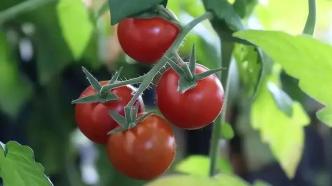
People fall silent when stressed, and sometimes explode. So how do plants respond to stress?
Israeli researchers have found that when tomatoes and tobacco are stressed -- dehydrated or their stems are severed -- they make sounds comparable to the volume of normal human conversation. While these sounds are too high-frequency to be detected by the human ear, insects, mammals and other plants may hear them. Related research was published in Cell on March 30. "Even if it's quiet, there are sounds that people can't hear, and these sounds carry information." Lilach Hadany, an evolutionary biologist at Tel Aviv University and the corresponding author of the paper, said, "But some animals can hear these sounds, so it may happen in nature. Lots of acoustic interactions."
Scientists have discovered ultrasonic vibrations in plants, and new research has the first evidence that they travel through the air.
"Plants interact with animals such as insects all the time, and many of them use sound to communicate, so it's impossible for plants not to use sound at all," Hadany said.
The researchers recorded sounds from healthy and stressed tomato and tobacco plants with microphones, and conducted experiments in soundproof chambers and noisy greenhouse environments. The researchers stressed the plants in two ways: without water for several days and by clipping their stems. The researchers then trained a machine learning algorithm to distinguish between plants that were not stressed, those that were deprived of water, and those that had been pruned.
The team found that stressed plants produced more vocalizations than unstressed plants. The sounds the plants make are similar to pops or clicks, with a stressed plant making about 30-50 clicks per hour, at seemingly random intervals, but much less in unstressed plants . "When the tomatoes are completely free of stress, they're very quiet," Hadany said.
The water-deprived plants started making noises before they were visibly dehydrated, and the frequency of the sounds peaked after five days of water deprivation, and then declined as the plants dried out. Also, the types of sounds plants make vary depending on the cause of the stress. The machine-learning algorithm was able to accurately distinguish between dehydration and the stress of cutting, and could also tell whether the sound was coming from a tomato or a tobacco plant.
While this study focused on tomato and tobacco, the research team also documented other plants. "We found that many plants, such as corn, wheat, grapes and cacti, make sounds when they are stressed," Hadany said.
The exact mechanism behind these noises is unknown, but the researchers believe they may be caused by the formation and collapse of air bubbles in the plant's vasculature, a process known as cavitation.
It's unclear whether plants make these sounds to communicate with other organisms, but their presence has major ecological and evolutionary implications. "Other organisms may have evolved to hear these sounds and respond to them," Hadany said. "For example, a moth that intends to lay eggs on a plant or an animal that intends to eat a plant could use sound to help decision making."
Other plants may also benefit from these sounds. Hadany and the rest of the team previously discovered that when plants "hear" pollinators, they increase the concentration of sugar in their nectar. Other studies have also shown that plants change their gene expression in response to sound. "If other plants get information about the stress before it actually happens, they can prepare," Hadany said.
Plant sound studies could be used to improve agricultural irrigation systems to monitor crop hydration status and help distribute water more efficiently, the researchers say.
"We know there's a lot of ultrasound -- every time you use a microphone, there's a lot of things that make sounds that humans can't hear," said Yossi Yovel, a neuroecologist at Tel Aviv University and corresponding author on the paper. Plant vocalization research opens up new ways to harness these sounds. a whole new way.”
"So now that we know that plants do make sounds, the next question is 'who might hear them?'" Hadany said. The ability to recognize and interpret these sounds in their natural environment."
Related paper information:
http://doi.org/10.1016/j.cell.2023.03.009
(Originally titled "When the pressure is high, the plants will also "scream"")
